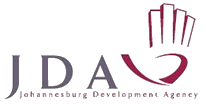The public will soon have the opportunity to vote for a new name for the Empire-Perth Corridor between central Joburg and Soweto, as the City’s campaign to name and brand its three emerging Corridors of Freedom gains momentum.
The campaign aims to create a more inclusive identity for each Corridor of Freedom, based on the cultures, histories and achievements of communities living along the Corridor.
Tasked with driving this process, the Johannesburg Development Agency (JDA) – a lead agency in conceptualising and implementing the Corridors initiative – devised a campaign that seeks to capture people’s imaginations while promoting a sense of shared ownership of the Corridors.
Starting with the Empire-Perth Corridor, the JDA ran a competition in which saw groups of grade 9 learners from 11 local schools researching, workshopping and brainstorming to come up with candidate names for their Corridor.
SCHOOLS COMPETITION YIELDS SHORTLIST OF FIVE NAMES
Coronationville Secondary School learners make a case for their proposed name for the Empire-Perth CorridorCoronationville Secondary School learners make a case for their proposed name for the Empire-Perth Corridor of Freedom during a presentation at Rand Girls’ School on 30 September.The learners were selected from schools situated along the Corridor, which includes suburbs such as Parktown, Richmond, Cottesloe, Melville, Westdene, Brixton, Coronationville, Westbury and Newclare.
With assistance from postgraduate students from Wits University, groups of five learners from each school conducted historical research and interviewed community members in their own and neighbouring suburbs.
They were also guided by JDA research on the Empire-Perth Corridor and its standout features, such as its wealth of educational institutions – including Wits University and the University of Johannesburg – and impressive architectural heritage.
PUBLIC TO VOTE FOR FINAL SHORTLIST OF THREE
On 30 September, the learners all gathered at Rand Girls’ School in Parktown to present their names to a panel of judges, who selected a shortlist of five. In early 2016, the five names will be announced and put to a public vote using mobile voting technology.
A final shortlist of three names, as voted for by the public, will then be presented to the City Council to make the final decision on the name of the Corridor.
Bosmont Muslim School was one of 11 schools that participated in the competition.Bosmont Muslim School was one of 11 schools that participated in the JDA’s Corridor naming competition.Once the Empire-Perth Corridor has its new name, the process will be repeated for the Louis Botha Avenue Corridor between central Joburg, Alexandra, Sandton and suburbs further north, and then for the Turffontein Corridor.
‘NAMES ARE THINGS THAT STIR PEOPLE’S EMOTIONS’
In each case, the new name will help to build the brand of the individual Corridor, as well as of the Corridors of Freedom initiative as a whole.
Eric Itzkin, Deputy Director for Immovable Heritage in the City’s Arts, Culture and Heritage Directorate, said in a recent interview that the new name for the Empire-Perth Corridor would be “a big part of the image and of the whole experience of the Corridor”.
The naming campaign provided an opportunity for a creative process, for capturing the distinctiveness of the Corridor, as well as for real public engagement, Itzkin said. It would help to generate interest and “a sense of excitement, a sense of anticipation for the further roll-out of the Corridors.
“Names are things that stir people’s emotions, so we’re tapping into that.”
CHANGING THE CITY’S SPATIAL DESTINY
Providing residents with efficient, affordable connections to places of work and leisureProviding residents with efficient, affordable connections to places of work and leisure.A crucial part of the Joburg 2040 Growth and Development Strategy, the City’s Corridors of Freedom programme seeks to undo the legacy of apartheid town planning, which saw the majority of Joburg residents shunted to the city’s outskirts, far from access to services, jobs, training and growth opportunities.
It aims to do this by laying down well-planned transport arteries – the Corridors of Freedom – linking mixed-use development nodes which are characterised by high-density accommodation supported by office buildings, retail development, and opportunities for leisure and recreation.
The aim is to “re-stitch” the city to create a new future in which residents live closer to their places of work, study and leisure, with fast, safe and affordable public transport giving people easier access to essential amenities while reducing reliance on private vehicles.
As Executive Mayor Parks Tau stated when he first announced the Corridors of Freedom, in his State of the City address in May 2013, the initiative will not only open up a new set of opportunities for residents, but will also improve the social fabric of the city.
“For the average Joburger, the option to live closer to the core of the city and to make use of an improved transport system will be a life-changing affair,” the Mayor said.
“Gone will be the days of being forced to rise in the early hours of the morning to catch a train, bus or taxi to a place of work. Gone will be the days of residents returning to their homes late in the evening, unable to share a meal or spend quality time with their spouses and children.”
In his latest State of the City address, on 6 May 2015, Mayor Tau said the Corridors programme was the City’s “next area of acceleration”, noting that the planning and budgeting frameworks for the first three Corridors had been finalised and approved.
And Finance MMC Geoffrey Makhubo, in his 2015/16 Budget speech on 26 May, set aside a large part of the City’s three-year capital budget for implementing the programme – in particular, for continuing the roll-out of the transport and other infrastructure that forms the backbone of the Corridors.

